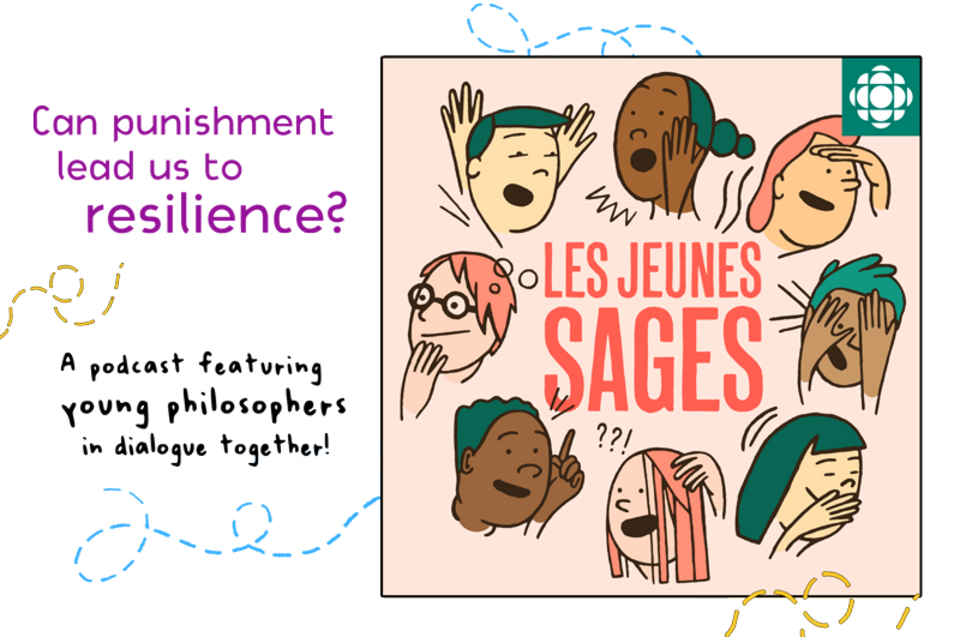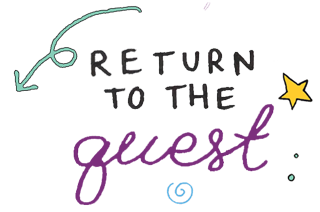
Resilience: here and there, or everywhere?
| Objective: To feed your philosophical reflections on resilience with the help of your family during lunch! |
Duration : 30 to 75 minutes
Material :
-
Sheets of paper and pen
-
Coloured pencils and markers
-
Your family
Instructions :
It's time to eat! Gather your family around the table for a powerful dialogue about resilience. Explore the following questions, finding inspiration in the thinking prompts as necessary. Together, think of reasons to explain your positions and try to build an answer by combining your ideas! But don't worry if the urge to keep talking doesn't subside... philosophical picnics are an insatiable quest!
...
- Question 1: Does being resilient mean you find nothing difficult?
- Thinking prompts : Many people seem to think that resilience is all about dealing well with adversity—that is, with tough situations, hardship or bad luck. But can you be a resilient person and still find things hard to handle? Or does being resilient mean you are always optimistic and strong, no matter what? As a family, think of some people you know who strike you as resilient—what makes them so special and why? Can you come up with some personality traits or conditions that give them resilience? Hmm... maybe they’re actually quite ordinary… but know how to pick themselves up when they fall. What about a situation when you or someone else could have demonstrated resilience but didn’t? What was missing in your feelings, thoughts and actions? Do you think resilience is something we can learn? Go back and read the definition you wrote in your Idea Stretching and compare it to what your family is considering now! Does your definition need an update?
-
Question 2: Is being resilient the same as being perseverant?
- Thinking prompts: Life can be full of challenges but as humans we seem to come up with many sayings to help us carry on, like “Never give up!”, “Eyes on the prize!” and “If at first you don’t succeed, try, try, try again!” But are these uplifting words encouraging us to be resilient… or perseverant? As a family, try to figure out if there is a difference between these two concepts—and also what they might have in common! Are they both important, even necessary? Does one result in the other? Ah, the conceptual confusion! To help sort things out, imagine resilience and perseverance are two salespeople trying to sell your family on what they have to offer you. What might be their sales pitch—that is, what they tell you to convince you to buy them? Now imagine you buy one of them but not the other: What might be the effects on your lives? Hmm… maybe it depends on the circumstances you’re living…
- Question 3: Should we be resilient at all times?
- Thinking prompts: There seems to be a real buzz about resilience these days… as if it were the ability to have! But could too much resilience be a bad thing? Perhaps it becomes unpleasant or even dangerous in excessive amounts? With your family, consider whether we should be resilient about everything. Think about some situations when resilience might actually lead us off track: what about if you keep trying to reach an impossible goal? Or you put up with mistreatment for too long? Or you put pressure on others because it’s easy for you to bounce back? Together, try to imagine a person who is so extremely resilient that it ends up harming them… or those around them. What goes wrong, exactly? And what could help make things right? Perhaps it is possible to have too much of a good thing after all! Try to finish the sentence: If resilience didn't exist, then _________.
...
Bonus : Have you noticed that negative feelings have a tendency to stick like velcro? That’s why lots of resilience experts say we have to learn to tune in to what’s positive… like we’re on a hunt for it! But what could this kind of hunting look like? As a family, decide together what colour you want to associate with positivity. Now grab a camera or a smartphone, and go hunting for that colour around your house or neighbourhood, snapping photos of objects and settings with that colouring! Are you suddenly seeing it everywhere, like it’s jumping out at you? When you’re finished, look at all your pictures and assemble them into a collage or mosaic, noting how your positivity colour stands out. Ask yourselves if you can you learn to “see” your life in the same way, with positivity popping out of situations like a vibrant hue? Is life better with a positive outlook? Is there a risk to not “seeing” the negative anymore? Why or why not? |

| Tricks for tots : Ever tried to drown a plastic ball? It’s impossible! If you have one at home, try it out by dunking it into a bowl of water. No matter how far you push it down, it will keep bouncing back up. And if you push it further, it springs up even faster! But, if you put a hole in it, suddenly it’s not so bouncy… and it might start to sink. What can this experiment teach us about resilience? Some people say being resilient means bouncing back when life knocks us down… and making sure we take care of ourselves so we can recover from the tough stuff that sometimes happens. Can you think of three ways to become as bouncy as a plastic ball in your own life? Now invite a friend or family member to do the same. Are their bouncy ways similar or different to yours? |
| Tips for teens : Parlez-vous français ? As you prepare your meal or digest your feast of delicacies and tasty ideas, listen to the Les jeunes sages podcast on punishment. Drawing inspiration from the reflections of the young philosophers, try to answer the question: Can we learn without punishment? Do you agree or disagree with the answers given by the participants? Try to think of lines of thinking that have not been addressed. What other angles of the concept of punishment deserve to be explored? Perhaps wonder about the link between resilience and punishment… Can punishment lead to resilience? Should we punish those who make mistakes? Is forgiving a sign of resilience… or could it be unfair? If you can’t understand French, don’t worry! You can still wonder about these questions! You can even imagine that you are recording a podcast with your family… Family Wisdom! |
Share your creative reflections by sending them via email.
Include photos of your projects and notes of your thoughts, as well as your first name and your age!


